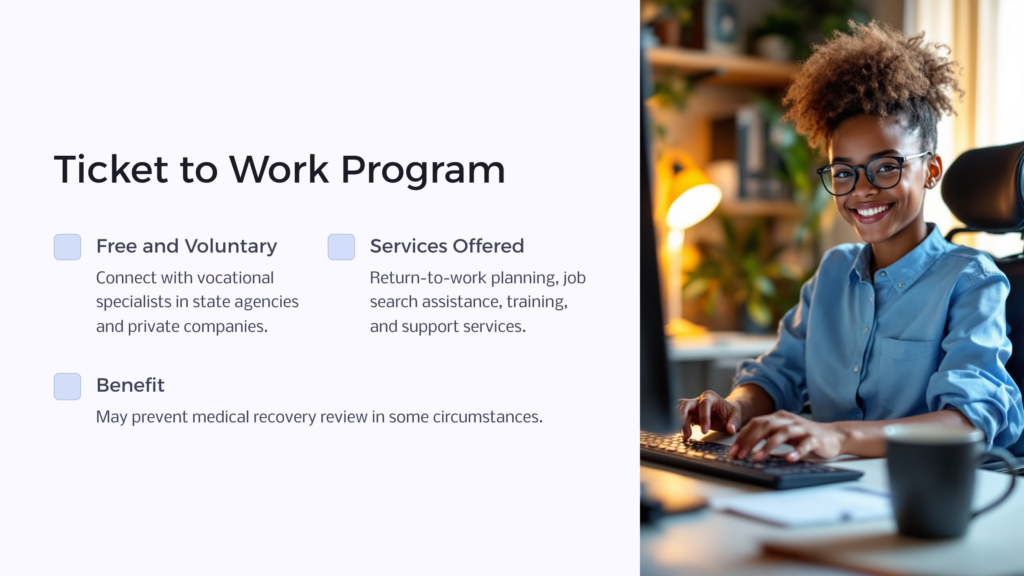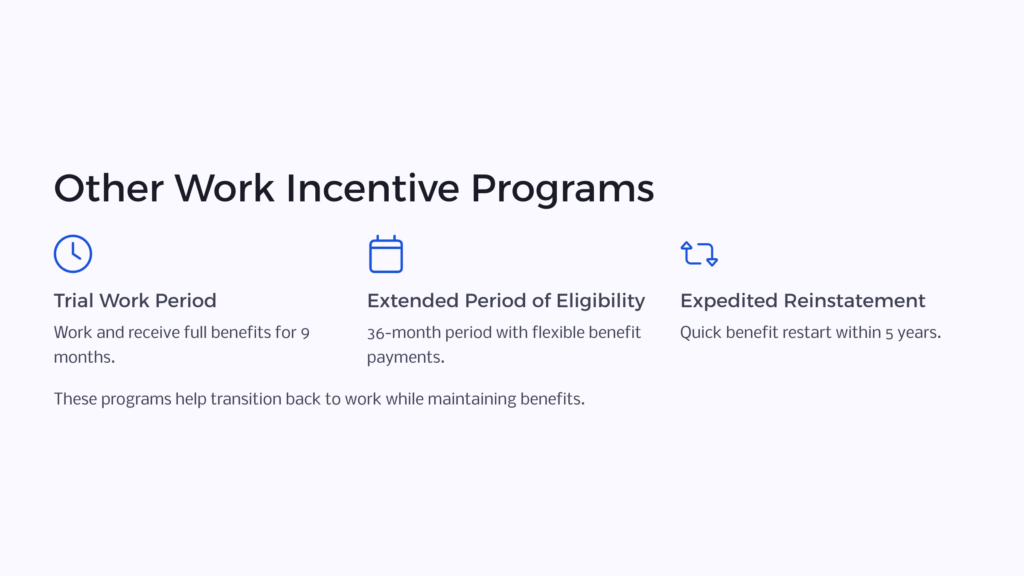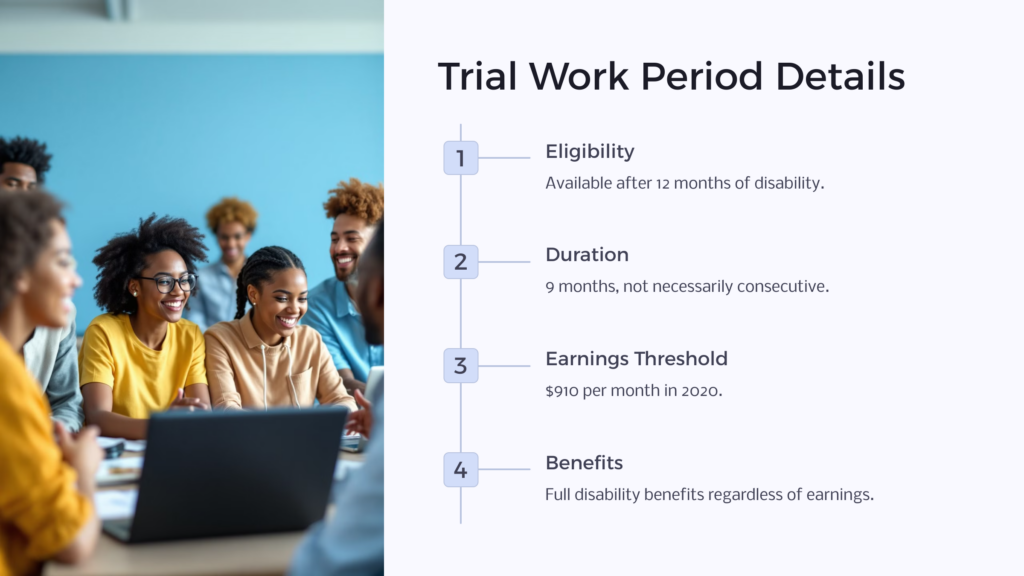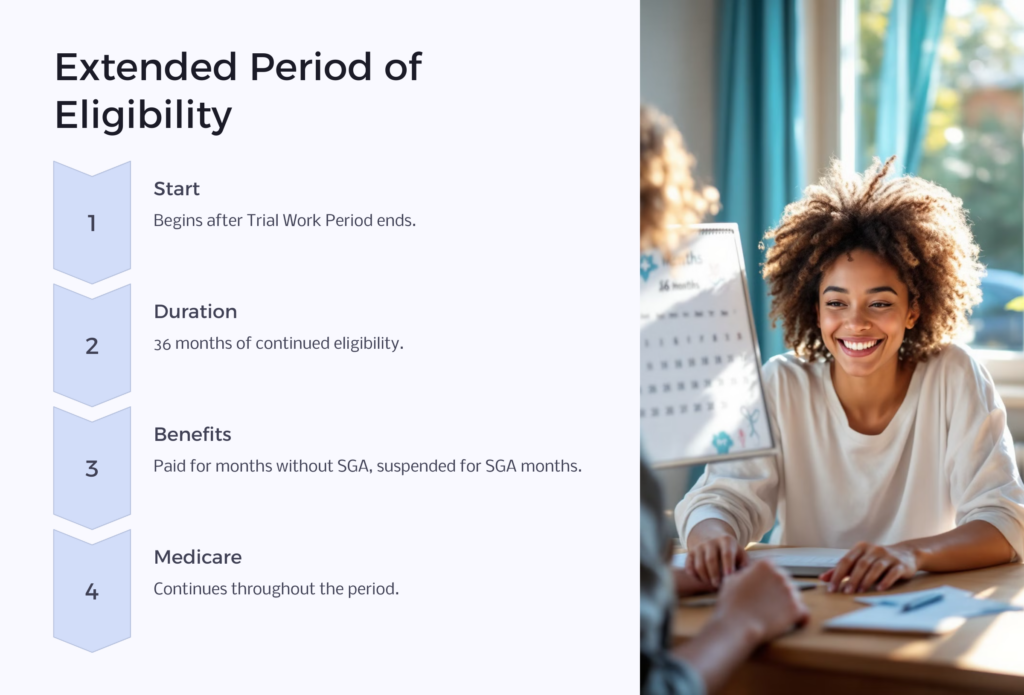Working While on Social Security Disability
If you have not recovered from your disability, Social Security has several programs that can support your return to work. In some circumstances, you can be working while on Social Security Disability and continue to receive full disability benefits. However, to avoid overpayments that you will have to repay, it is important to report to Social Security as soon as you start work. It can also be helpful to talk to a Social Security representative about your work plans before you actually begin working so that you can take advantage of Social Security’s return-to-work programs.
Ticket to Work

At any point in time, you may be eligible for Social Security’s free and voluntary “Ticket to Work.” This program connects you with a network of vocational specialists in state agencies and private companies. Some examples of services that are available through the Ticket to Work program are return-to-work planning, job search assistance, training or education, and other support services that you may need to obtain and keep a job. If you are using Ticket to Work, in some circumstances, your claim will not be reviewed for medical recovery.
Other Disability Work Incentive Programs

In addition to the Ticket to Work, Social Security’s work-support programs for individuals receiving Social Security based on disability include a Trial Work Period, an Extended Period of Eligibility, and Expedited Reinstatement. There are also provisions for continuation of Medicare health insurance.
Supplemental Security Income (SSI) offers return-to-work support with the Plan for Achieving Self Support (PASS) program, which must be set up and approved before taking actions in the plan.
Working on Social Security Disability When Earnings Aren’t Substantial
A key concept in Social Security’s definition of disability and in its work incentive programs is “substantial gainful activity,” which is called SGA for short. Social Security generally defines substantial earnings as a certain dollar amount. In 2019, generally $1,220.00 earnings per month are substantial for non-blind workers and $2,040.00 is substantial work for the blind. These amounts refer to your gross earnings if you are an employee and your net profit if you are self-employed. However, Social Security looks at many factors when determining whether your work is substantial, especially if you have been disabled for less than twenty-four months and you are self-employed.
In general, regardless of which work programs you participate in, if your work never reaches the level of substantial gainful activity, you can work and receive Social Security Disability indefinitely, as long as you do not recover medically. Additionally, your eligibility to Medicare health insurance will continue while you work. Even if you think that your work is not substantial, it is important to report your work activity to Social Security as soon as you start working and whenever you have changes in hours, pay, or duties.
Trial Work Periods and Continuing Eligibility

Whether or not you participate in the Ticket to Work program, your work activity will be evaluated through three work-incentive programs. The first that comes into play is the Trial Work Period. You are eligible for a Trial Work Period after your first twelve months of disability. A Trial Work Period consists of nine months, not necessarily in a row, during which you earn at or above the Trial Work Period earnings level, which in 2020 is $910.00 per month. Note that the monthly amount that defines a Trial Work Period month is less than the dollar guidelines for the substantial gainful activity. During your Trial Work Period, you will receive full disability benefits regardless of how much you earn. Medicare will continue also as long as you pay any required Medicare premiums.
Work in the Extended Period of Eligibility

When your Trial Work Period ends, you enter into another work incentive program, which is a thirty-six-month Extended Period of Eligibility. The extended period begins the month after the end of the Trial Work Period, whether or not you are working at that time. During the Extended Period of Eligibility, you will be paid for months in which you do not perform substantial gainful activity (SGA). On the other hand, your benefits will be suspended for any month that your work is SGA. The only exception is that you will be paid benefits for your first month of SGA in the Extended Period, plus the two following months. During the full thirty-six months, your entitlement to Part A Medicare will continue whether or not you are receiving a benefit check. Part B and Part D Medicare will also continue if the premiums are paid.
In 2020, SGA is usually $1,260 in gross wages or net self-employment profit for non-blind workers and $2,110 for blind workers. Earnings can be reduced by Impairment-Related Work Expenses (IRWE’s) including but not limited to medications taken for your disabling illness or injury. If you are receiving special accommodations at work, your wages may be considered to be subsidized, which could reduce earnings above SGA to a figure below the SGA threshold.
Disability Benefits and Medicare After the Extended Period of Eligibility
At the end of the thirty-six-month Extended Period of Eligibility, if you are engaging in substantial gainful activity, your Social Security benefits will stop. However, if you are not working or your work is not SGA, your benefits will continue until the first month you perform SGA, at which time, your disability benefits will be terminated. If your cash benefits end because of your work and you have not recovered medically, your Medicare insurance will continue for an additional fifty-seven months.
Requirements for Expedited Reinstatement
The next work incentive we’ll look at is Social Security’s Expedited Reinstatement. This procedure is available to people whose benefits were terminated at the end of their Extended Period of Disability because they were working and performing a substantial gainful activity. If within five years of when your benefits ended, you again stop performing substantial gainful activity because of the same condition that originally disabled you, you may be eligible for reinstatement of benefits without a new application. If you are eligible for this Expedited Reinstatement, you will not have an unpaid five-month waiting period. Additionally, you will receive six months of temporary payments while the Social Security Administration determines whether you are disabled and eligible for reinstatement.
Support for Working While Receiving Social Security Disability
As you can see, Social Security offers a lot of support for your return to work. Your local Social Security office can provide you with more information about your benefits as related to your particular work desires and situation. Also, Social Security’s “Red Book” has detailed information about its return-to-work programs and about working on Social Security Disability. The “Red Book” is available online at Social Security’s website, www.ssa.gov or you can order a printed copy from your local Social Security office.
Is there any way that my Medicare can continue if my Social Security Disability benefit stops because of my work?
See how your eligibility for Medicare can continue after your Social Security Disability benefit has been suspended or terminated because of your work.
Medicare Continuation without Disability Benefit Checks
Your Medicare can continue when your Social Security Disability benefits have been suspended or terminated if you have not recovered medically and your benefits stopped because you were performing substantial work.
Medicare Return-to-Work Incentive
One of Social Security’s return-to-work incentives is the Extended Period of Eligibility which is the thirty-six months following your nine-month Trial Work Period. During the Extended Period, your benefits will be suspended for months in which your work is substantial. During this Extended Period, your Part A Medicare will continue and, if you pay the premiums, your Part B and Part D Medicare will also continue even in months you do not receive a disability check. After the thirty-six months end, if you have not recovered medically but your benefits have been terminated because of your work, your Medicare insurance will continue for another 57 months.
 Benefits.com Advisors
Benefits.com Advisors
With expertise spanning local, state, and federal benefit programs, our team is dedicated to guiding individuals towards the perfect program tailored to their unique circumstances.
Rise to the top with Peak Benefits!
Join our Peak Benefits Newsletter for the latest news, resources, and offers on all things government benefits.




















